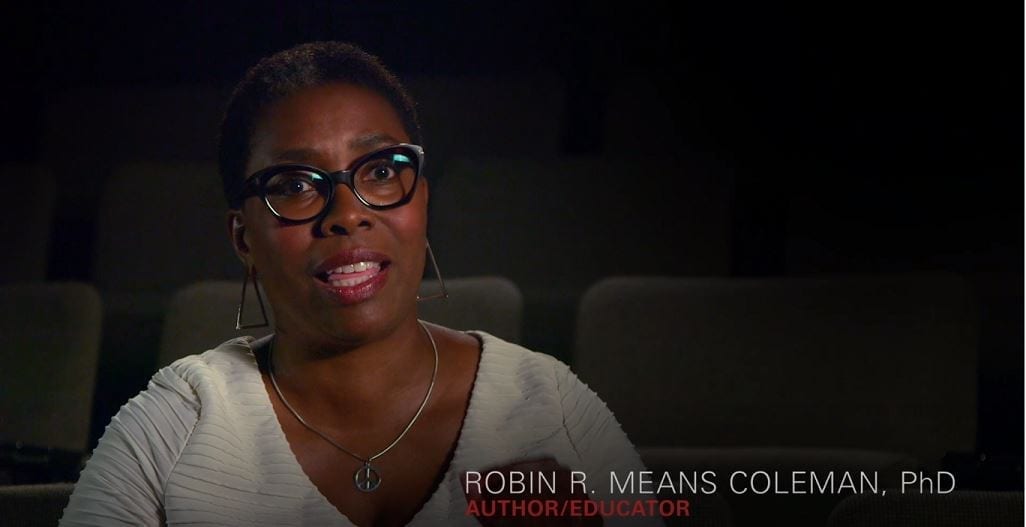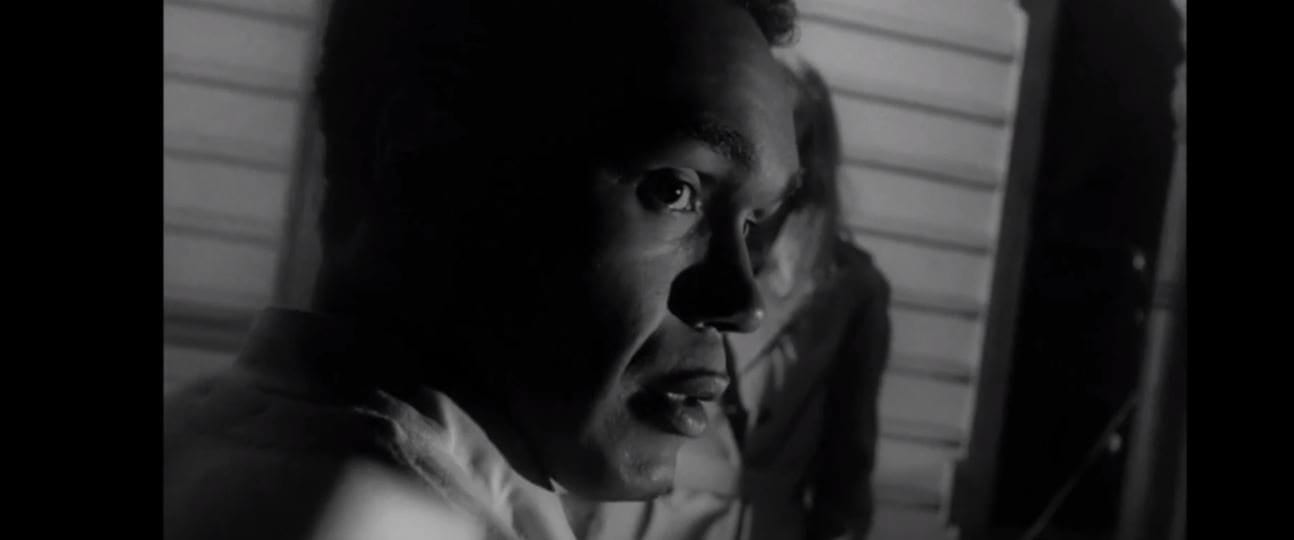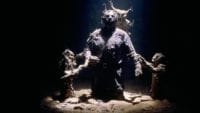Dr. Robin R. Means Coleman, Vice President and Associate Provost for Diversity at Texas A&M and author of 2011’s Horror Noire: Blacks in American Horror Films from the 1890s to Present, spoke with Horror Obsessive following the release of the Shudder original documentary based on her book. We hope you enjoy the interview and check out the documentary as well as Dr. Coleman’s indispensable book.
Horror Obsessive: First of all, thank you for taking this interview. The staff of 25 Years Later wanted me to tell you how excited we’ve been for it. The documentary, beyond being desperately-needed, seems to fill in some blind spots or expands upon AMC’s History of Horror that aired back in October, and they just added that to Shudder as well. But we know this documentary really comes from your book from 2011. So, when did you find out that there was interest in turning the book into a documentary?
RC: The first thing to say about this is that it is truly a women’s project. Three things conspired happily together. The first is I did—maybe not entirely in this order either—I did an interview with Ashley Blackwell, who does Graveyard Shift Sisters. I believe that is when Tananarive Due learned about the book and included it as her featured required text at UCLA; that brought some publicity to the book. I think that was just about a year and a half, two years ago. Then, I also did an NPR Code Switch interview, which is one of the more popular, I’ve heard, because it’s really funny, and they’re typically not funny. Those three things happened: Ashley, Tananarive, and myself kind of getting together to talk about horror and I guess about that time—I was still in Michigan—so maybe a year or so, a year and a half ago, there started to be talk about turning it into the doc.

Horror Obsessive: So, it moved pretty fast.
RC: It moved really, really quickly. In fact, I shot my part here on A&M’s campus not long after I arrived. (Around April 2018).
Horror Obsessive: I know that there have been screenings in L.A. and New York. What has it been like to have this kind of celebrity attention to your research, that high visibility? What has been the best part of it for you?
RC: I think moments like this. There’s such great excitement about the book and the documentary and not just from sort of hardcore horror-heads, but from people who are accessing this, not just about horror, but about kind of critical cultural examining of race and representation treatments in front of and behind the camera. So, there’s something in both the book and in the movie for everyone to kind of latch or hold on to, and you don’t need to be a horror fan to really participate in the conversations about what this country is saying about race, particularly about Blackness today.
Horror Obsessive: That is kind of perfect for my next question because I know that the documentary and the book kind of start with Gus from A Birth of a Nation, who is lynched for pursuing a White woman; he’s characterized as such. It’s screened at the White House for Woodrow Wilson, who ends up endorsing that false characterization, and what did he say? “My only regret is that it is all so terribly true.” My first note when I was watching it was Charlottesville and I thought … well, that was in regard to any president who would refuse to acknowledge outright racism. So, how can or how do horror films help us reconcile our progresses when we are constantly reminded of our failings?
RC: Horror is very cool because it allows us to really push the conversation in places that in ways that right now, for example, news or say network television is ill-equipped to do. Horror is that innovative, heroic space—I think sometimes in part because people don’t expect much from horror. These horror films are often Spielberg films, right, or Lucas Films, and so horror can be blockbuster, it can be underground, it can be shot on someone’s iPhone, and all of those folks who access the genre—especially around Black horror—are saying something about our social, political world. That is actually the hallmark of horror. It isn’t so much the blood and guts, and you won’t see a lot of blood and guts in Black horror. What horror does is, I think Tananarive says, “Black history is horror; horror is Black history,” to paraphrase that, and that is absolutely correct. The genre picks that up and it deals with it, which is different than other forms. They actually deal with it and sometimes in dealing with it the solutions are a little scary, but they take those issues head on.

Horror Obsessive: On the topic of the 1980s, you talk about that trend of these films where Blacks are the first to die and then you challenged that notion by saying Blacks play a particular role. Could you elaborate on that a little bit as well?
RC: Sure, there are two things that happened in the 80s that I think are worth teasing apart. The first is that Blacks really kind of disappear in the 1980s—for mainstream Blacks in horror films—and there’s a reason for that. It’s tied to space in the suburbs, right? The 70s are all about the urban, the so-called Blaxploitation period. When we get to the 80s, in mainstream horror films, there’s White flight. White families flee to the suburbs, which presumably means that there’s less Black and Brown bodies behind in the urban. So, how do you get to the horrific moment? If Blacks have always carried the horror—Gus, right, from Birth of a Nation—and we flee that, then where does the monster come from? So, that’s when you start to see the Nightmare on Elm Streets, the Friday the 13ths, the Halloweens, where now it’s supposed to be White families looking in the mirror at themselves and reflecting on the horrors and the atrocities that they are now implicated in. However, there was a twist to that, and Poltergeist is a good example, Amityville Horror is a good example, where even still in the absence of the presence of Black and Brown bodies, we’re implicated in the horrific and so that is their home. You know, their McMansions are built on Native American burial grounds, like a Pet Cemetery; the evil was literally permeating up out of the ground and infecting Whiteness. The Shining is another great example of that, where it’s still that kind of maddening process. That’s the first part. The second is that Blacks do serve a function; they don’t always get killed off in the first five or ten seconds of a movie. If you need to establish a monster’s superiority, you need to have—as I often joke, a big Black man with a big black gun. Who is going to help establish that? So, you’ve got this really big, loathsome monster, as in Predator 2, right?
Horror Obsessive: Oh, yeah.
RC: But to establish that that Predator is, you know, really kind of a bad-ass. It has to, you need … you know, like the Colombians and the Jamaicans who are, up until that point, the monsters. So, they need to kill each other and battle each other and engage with each other and wreak havoc and do all of these things, and you’re like, “Oh, whoa, they’re super bad.” They’re super monstrous, so they carry a monstrosity that helps set up the uber-monster. So then, when that monster, the Predator, takes them down; then, you know you’re dealing with the King Kong, the Godzilla of all monsters. So, Blacks serve a purpose in these films and they can’t die first to set up the monstrosity.
Horror Obsessive: That’s interesting because what you talked about there, especially with Predator 2, there’s that Voodoo in the back alleys. You know, you’ve got the Jamaicans. One of the things your documentary did was to get me to go look at Grady Hendrix’s book, Paperbacks from Hell, where he has a history of 70s and 80s horror paperback fiction. He points out that nine months after The Exorcist came out, Joseph Nazel writes Black Exorcist; the cover blurb reads as “Voodoo rituals and human sacrifices spawned by a cult of Black devil worshipers grips a town in a nightmare of terror!” After studying the history yourself, what do you see as the largest terrors that have been associated with Blacks through the horror genre?
RC: Well, certainly it has been Voodoo, right? The Serpent and the Rainbow is here. So that, what’s the one with Lisa Bonet and Robert DeNiro?
Horror Obsessive: Oh, … Angel Heart?
RC: Angel Heart, right. Angel Heart is really wicked, right, because even Satan is like, “Whoa, Voodoo beats me,” right? So, clearly the things that have been associated, you know, Black bodies are represented as these sort of oddly deficient and deviant, both culturally, bodily … that deficiency that scares people, a perfect othering on all points, right? So, culturally, spatially, class-wise, and now around religiosity, I think that’s the biggest challenge.

Horror Obsessive: One thing you talk about that I think is an important distinction in your book. You’re very careful to make the distinction between Blacks in Film and a Black Film. So, can you speak to that a little?
RC: There are really good examples. For example, Candyman is Blacks in horror. A movie like Def by Temptation by James Bond III is Black horror. So, the key point here is that Black horror is marked by a deepened attention to Blackness: Black life, culture, history, and experience, like in Eve’s Bayou by Kasi Lemmons, right? There is sort of a cultural echo that permeates those films; they’re Black cast, Black scripted, and so they speak very specifically to Blackness. People Under the Stairs has a Black lead, right, in the character, Fool, but it’s not about Blackness. You will also see the difference between, say, a People Under the Stairs and an Eve’s Bayou in sort of their representation, and I still assert that representation matters. In this case, not just on the screen but also how we are represented behind the screen and in the screen writing room. So, Black horror treats Black subjects as subjects and not objects, not as tokens, but as whole and full and realized, complex individuals—the way anyone would want to be treated or seen in representation.
Horror Obsessive: The documentary kind of goes beyond your book also to usher in Jordan Peele’s next effort we’re all excited about with Us.
RC: Yes.
Horror Obsessive: It was good timing because it gets to contextualize the history of Blacks and American horror films that has led to, I think, his momentum, Peele’s momentum. Can we look forward to an updated edition of your book anytime soon?
RC: Great question. I’m hoping that it will happen, and I actually also think that there will be … I’m hoping that we’ll be able to have a co-authorship moment between me and Ashley and Due, and also someone who has been really influential in keeping people current with the Black horror movie trend, who is Mark Harris, who has BlackHorrorMovies.com. I think that there’s real talent here and a collaborative project is absolutely the way to go.
Horror Obsessive: Absolutely. So, were there any points that you made in your book that, given a perfect world, you would have liked to have seen given more time in the documentary?
RC: I think that it does what it’s supposed to do, which gets people talking, and that’s what’s happening—a conversation about the history of horror. The one point that I wish we had been able to highlight more is the enormous contributions of women and women of color in horror and you know, some of it is mixed in quality, but even as the film was coming out The Girl with All the Gifts…what was it, Escape Room, Aliens vs Predator. Now you see women of color who are not just being dropped into these movies but carrying them and carrying them to box office gold, and I think that’s the thing we should be paying attention to.
Horror Obsessive: Yeah, I agree. Are there any points you want to discuss?
RC: This project was a long time in the making, almost ten years. Yeah, I watched hundreds, if not thousands, of horror films and was lucky. Finally, when I landed at the University of Michigan, which has the largest collection of horror films in the country, I was able to pick up good speed, and they would just deliver to my office dozens and dozens of horror films a day. So, if you’re a fan, it’s really exciting, and psychologically it wasn’t disruptive or startling because Black horror isn’t about torture porn. It’s not Saw. It’s not Human Centipede. It’s not gross-out. Black horror tends to have a powerful message.
Horror Obsessive: Tananarive says in the documentary that “Blaxploitation” kind of gets mixed marks, but it’s clear that horror films are trying to do something else. While I think you’ve already spoken to it, what is it about the horror genre that has that potential for challenging our societal messages?
RC: So I think what she … I wasn’t present when she said that, but Blaxploitation films on the whole, that kind of genre—and film scholars have certainly been disrupting that moniker—but they were low quality kind of AIP, American International Pictures, so they were these low quality derivative kinds of films. AIP never was a leader; it always followed trends and then did things on the cheap. So, that also then meant Black horror of that period was also a victim of that. So, you know, Dr. Black and Mr. Hyde, The Thing with Two Heads—people would even say Blacula vs Dracula—so you had those kinds of things happening, but Blacula and Scream Blacula Scream still remain two of the more significant and thoughtful vampire films that reflect on race. I mean, my goodness, Blacula starts with an indictment of the slave trade. Then, when he is entombed by Dracula, Mamuwalde makes this sort of late move through the Middle Passage, a transition through the Middle Passage to the U.S., where it picks up, and you see the continued devastation, the effects of this long history of slavery, then Jim Crow, then the carceral state, police brutality, the devastation, the introduction of weapons and drugs; that’s what Blacula does. Horror can do that. Certainly the 70s was provocative in its political attention, but horror does that. It points our attention to both the sociopolitical challenges, but also triumphs and complicates Black communities’ responses to both.

Horror Obsessive: With Peele’s upcoming projects, I think his company’s involved in Lovecraft Country for HBO and Twilight Zone for CBS—it’s hard to keep up—a remake of Candyman or a reimagining of it.
RC: That’s what I’ve heard. You know, Candyman kind of stands. We’ll have to see how that goes, but I prefer when people remake or reimagine things that weren’t classics versus reimagining classics. So, as an aside like an Ocean’s 11, that was good because the first one wasn’t that great, right? So, if you are reimagining it, look what he did. Leave classics alone, because they’re classics, but go back into the trove of horror films where there is good potential to be mined and bring out some of those.
Horror Obsessive: It’s going to be hard without Tony Todd; someone has a task. Well, so what do you think the future is? What are your hopes for the future of the Black horror films?
RC: So, I do think the future is women. I think we’ll see all around the genre more people like Ashley Blackwell and Tananarive Due, who will be writing about horror in really interesting ways. We’ll see more women behind the camera and we’ll see more, certainly more women starring and pushing the genre forward. So, I do think that is the future of horror. People ask if we’re in a horror renaissance. I think it helps when a horror film, particularly a Black horror film, wins an Academy Award or some other award. In that way it’s a renaissance, but I would also say the book Horror Noire starts with 1890, which means we’ve always been here. So, this isn’t anything new, but we do see a resurgence of good attention to horror and that’s pretty cool.
Horror Obsessive: That is cool. Well, thank you so much for your time. We really appreciate it.
RC: Take care.
Interview by staff member, Rob E King.



Horror stories are so intriguing that I try to read all of them. I have heard about this one for the first time, so I have ordered it online so that I can read the book when it gets here.